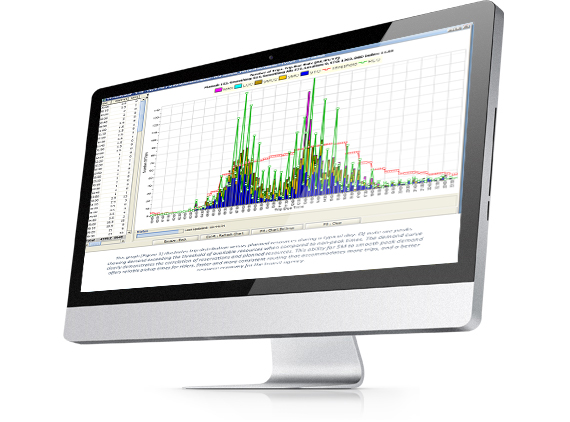


The booking process is the first step in maximizing efficiency and productivity for Transit Agencies and Transportation
Service Providers involved in paratransit service. Taking reservations arbitrarily and without adequate real-time awareness of available resources
can result in an uneven distribution of reservations over the course of daily operations; Invariably
resulting in undesirable routes and the inefficient utilization of resources.
Current routing systems allocate resources based on the highest peak loads, leading to periods of extreme resource utilization and low availability during peak high demand hours, and resulting in periods of high resource availability and low utilization during off-peak hours. The net result is rider dissatisfaction due to unreliable services, and a bad business economy for transit agencies and transportation service providers.
Most competing call taking reservation and scheduling software programs available on the market today rely on the “Single Trip Insertion” methodology, which does not evaluate multiple viable alternative pickup or drop-off times. Reservation systems which rely on Single Trip Insertion often fails to combine trips into shared rides because of slight deviations from pickup or drop off times between multiple riders in common locations. Because organizations using these less capable software solutions have already accepted their customer’s requested times without reconciling the request against trip-loading and available assets, they have no option but to task additional resources to these at the expense of reduced efficiency.

Effectively balancing an organizations available assets against those required for planned trip loads and distributing resources over the entirety of an entire day’s operation is of paramount importance for all phases of paratransit operations—from the first pick-up of the day, to the last drop off.
Integrated Transit Software Solutions (ITSS), 5M’s design team, recognized this fundamental shortcoming of existing reservation systems and has placed considerable emphasis on the design and development of a reservation system with fully integrated resource planning, routing, and dispatch capabilities.

5M’s unique and proprietary reservation and scheduling software, which is always working in the background, utilizes trip matching and demand balancing algorithms to automatically evaluate the rider’s pick-up location and requested time before suggesting alternatives—before, after, or a combination of before and after a rider’s originally requested time.
Offering riders these choices increases the likelihood they will be offered a useable time by taking a big-picture approach—autonomously comparing passenger scheduling and their pick-up and drop-off locations and combining those trips with commonalities into clusters of shared rides.
This greatly reduces the logistical strain on an organization’s fleet and human assets by significantly flattening peaks and distributing trips over a greater time range. 5M ensures ADA compliance while allowing operators to balance trip volume between peak and non-peak hours for the most efficient routing.